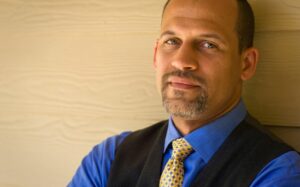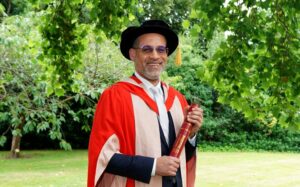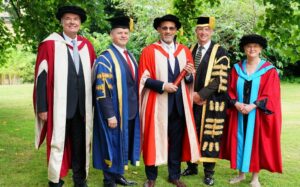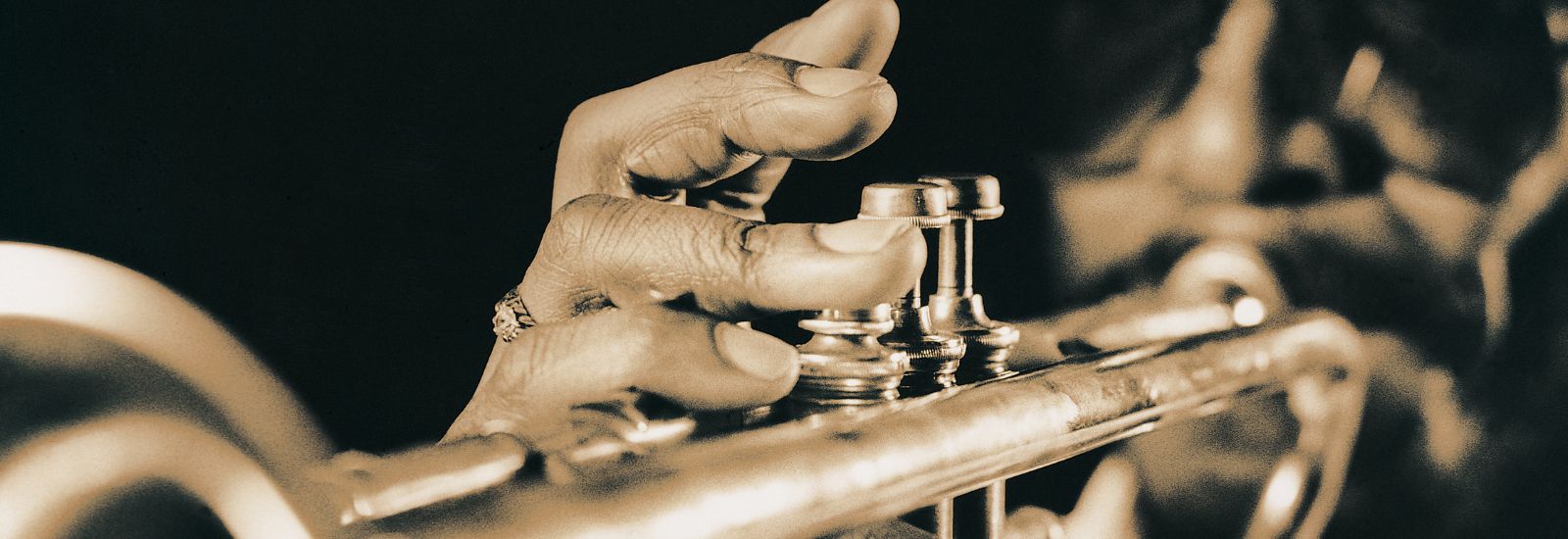“There is probably no better example of democracy than a jazz ensemble.”

These powerful words from Michelle Obama reflect a sentiment that underpins Dr Wesley Watkins’ musical mission. Reading graduate ‘Dr Wes’, as he is known, is the founder of The Jazz & Democracy Project® – a music integrated curriculum that uses jazz as a metaphor to bring democracy to life, with the aim of inspiring young people to become active, positive contributors to their communities. Dr Wes explained:
“I’m trying to educate young people to look at our society and its tensions through the lens of music, and in doing so, help them to perceive something either a little differently or to see something more clearly.”
CONNECTED had the pleasure of speaking to Dr Wes after he received his honorary degree from the University of Reading in 2024. He shared some of his most memorable moments, what inspired him to set up The Jazz & Democracy Project®, and why he feels learning from modern musicians is important for the next generation.
Composing connections
Dr Wes’ interest in music education was first sparked during his undergraduate studies at Stanford University and developed through his PhD which began at the University of Reading’s International Centre for Research in Music Education (ICRME).
It was on the Stanford-in-Oxford Programme where Dr Wes was introduced to Dr Nicholas Bannan – an international composer, conductor and music researcher – who was lecturing at Reading’s ICRME. It was Nicholas who encouraged Dr Wes to consider studying a postgraduate degree at Reading, and was later appointed as his PhD supervisor.
Dr Wes shared: “From the moment that I met Nick he took a real interest in me as an individual. He had proved that he believed in me and my work. I could have applied to Harvard or Stanford, but in the end Reading was the only place that I applied to for my PhD.
“To this day, I feel incredibly lucky to have been taught by Nick. He connected me with so many different people and places including the Bedales School, Eton College and the Yehudi Menuhin School, where I was able to learn from some of the best music educators and institutions in the UK.”
Full circle
Speaking about his experiences at Reading, Dr Wes shared some of his most memorable moments. He recalled: “While I was studying on the Stanford Programme, Nick introduced me to a Reading undergraduate student who wanted to set up a gospel choir. I had recently directed Stanford Gospel Choir, so I had some experience doing this and I helped the student create the Reading University Gospel Society (RUGS). When I was at Oxford I directed RUGS rehearsals at the Bulmershe campus, and when I returned as a postgraduate student I was pleased to see that the society was still running.
“One of the student singers – who also played percussion for the jazz band – suggested that the two groups collaborate. So, I wrote an arrangement of Dizzy Gillespie’s “Swing Low, Sweet Cadillac” where RUGS and the jazz band played together to end the concert. It was one of my biggest highlights whilst I was at Reading.”
 Upon completing his PhD, Dr Wes was unable to attend his graduation ceremony. However, last summer he was able to come full circle when the University presented him with an honorary degree.
Upon completing his PhD, Dr Wes was unable to attend his graduation ceremony. However, last summer he was able to come full circle when the University presented him with an honorary degree.
He said: “I’m a very low-key person. I keep my head down and put all my efforts into my work and the students I teach. I don’t expect people to know who I am as an individual, but I do want people to know about the work that I do and to respect it. So, when I heard that my work with The Jazz & Democracy Project® had been recognised by Reading, I was blown away.”
Jazz and democracy
After finishing his PhD in 2007, Dr Wes decided to put what he had learnt into practice and began working as an independent arts education consultant in the San Francisco Bay Area. His first role was helping an elementary school in Oakland integrate music into their curriculum, and he discovered how jazz could improve children’s understanding of democracy. This was the beginning of what would later become The Jazz & Democracy Project®.
He explained: “I asked one of the 5th Grade teachers what his students had difficulty understanding so that we could come up with a musical solution. He said he felt his students weren’t grasping the concept of what it means to be part of a democracy.
“So, we started teaching the students in parallel – with the classroom teachers delivering their normal history lesson, while I added in separate lessons about jazz. I taught the students that the goal of a jazz band is to swing. Swing is both an era and a rhythmic feel, but philosophically it’s also a buoyancy that is achieved when all the different components of the song are balanced. Everyone in the band has a role to play and when a band is swinging, everyone can feel it.
“But people interrupt the swing when, for example, someone in the band plays too loudly which disrupts the song’s dynamic balance.
“A well-functioning jazz band tells us something about a well-functioning democratic process; and a malfunctioning jazz band tells us something about a malfunctioning democratic process. Everything falls apart as soon as someone stops striving to maintain the swing.”
After six months Dr Wes decided to see whether this novel method of teaching was having any impact. He said: “I asked the class to give me an example of someone playing too loudly in society. A girl raised her hand and said, ‘that’s monarchy, because the people who wanted to settle in America were trying to escape the monarchy, and in a monarchy it’s about what the king wants – nobody else’s voice matters.’
“This showed that what we were doing was making a difference. From that moment, I decided that this was what I wanted to do for the rest of my life,” Dr Wes shared.
Upon discovering that this way of teaching had a profound impact on the students he taught, Dr Wes created The Jazz & Democracy Project® within the San Francisco Bay Area. Fast forward sixteen years and he now lives in Sydney, Australia, teaching students of all ages in schools, colleges and universities across the world.
 He also trains other educators to use the curriculum in their classrooms through his own online professional development course.
He also trains other educators to use the curriculum in their classrooms through his own online professional development course.
Dr Nicholas Bannan, said: “I felt very fortunate to see Dr Wes in action exploring the parallels between musical creativity and political representation. He is a very charismatic musician and teacher, who has created an exceptional concept that addresses both aspects of fulfilling human potential, individually and collectively.”
Inspiring the next generation
Dr Wes uses content from exclusive interviews with top musicians, including acclaimed singer and songwriter, Gregory Porter, to shape part of his curriculum, as he believes learning from modern musicians is important for the next generation. He said:
“Young people need more role models who confront risk and grow as a result. In jazz the musicians live on the edge of failure – a performance could fall apart at any moment unless everyone is listening to each other.
“Gregory Porter once told me, ‘if you’re not listening, not only can it cause chaos in the representation of the music, but it’s a disrespect to the music…even to the history of the music.’ Balance or compromise cannot be achieved if you can’t hear anything that may criticise your position. My goal is to teach students to continually evaluate their performance and that of others, and in doing so, encourage them to think critically and flexibly.
“I want to help people find and learn how to maintain the swing.”
Dr Rebecca Berkley, Associate Professor in Music Education at the University’s Institute of Education, said: “In honouring Wesley with this degree, we recognise the great service he is doing to educate so many of us about democratic thinking and promoting jazz as an art form.”
Find out about postgraduate research opportunities at Reading, or discover more about The Jazz & Democracy Project®.




